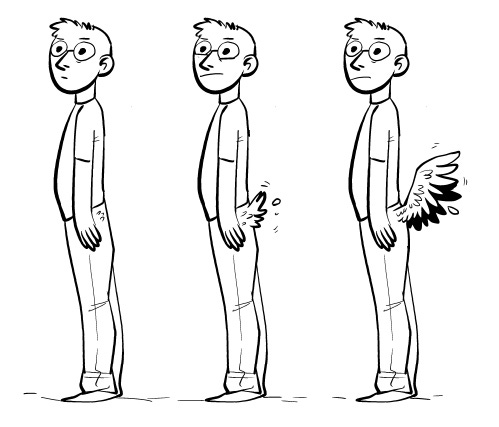The writer’s first responsibility
Writing life: 60
This post may offer more for writers, but avid readers with an interest in the creative process, should also find something here—he says, hopefully.
Rather than bury the lede—a sin I have committed on more than one occasion—let me clear up what my headline means.
I think, as writers, our first responsibility—to ourselves and our readers—is to figure out how each of us writes best.
I may have touched on this idea in earlier ramblings, but thought it warranted a closer look in a post of its own. Let me explain, starting with some context.
The myth of the tortured artist
The idea of tortured artists living noble lives of hardship and misery, suffering for their art, is now so ingrained in our societal consciousness that it has taken on an air of truth to which I’m not convinced it’s entitled. I sometimes think we writers cooked up this old cliché centuries ago and have carefully protected and promoted it ever since. I also think many writers believe that they aren’t real writers unless they are somehow suffering or labouring in misery.
I know writing is hard, but so are most other vocations, obsessions, hobbies, and interests. And I know writing isn’t the most remunerative career choice. So what?
I know it’s very common for writers to:
struggle with their work;
live with frustration and misery when they feel blocked;
feel discouraged and depressed when their writing just isn’t flowing.
And this brings me back to my opening point. I wonder whether writers endure these difficult periods because they have fully bought into the idea that writers suffer for their work, and that this is simply their lot in life. Well I have a different explanation for writers to consider.
Perhaps some writers are miserable and frustrated not because they have succumbed to the self-fulfilling prophecy of the tortured artist myth, but because they just haven’t yet discovered how they, as individuals, write best. They haven’t yet learned what writing process really works for them.
Discovering how you write best
I can say with near certainty, that no two writers on the face of the planet write in exactly the same way. Sure, some pursue similar approaches, but when you dig deeper and dissect their methodologies and practices, you will almost always discern differences. Starting out, writers will try out a certain way of writing based on, say, the process of their favourite writer. But inevitably, they will end up refining their own process—or overhauling it completely—as they discover what works for them and what doesn’t.
And make no mistake, there is an infinite number of ways to write. The somewhat crude spectrum on which every writer can be placed—whether they’ve thought of it in this way or not—runs from “Pantsers” at one end to “Planners” at the other. Simply put, from left to right, you’re moving from “no plan” to “a very detailed plan” before writing your manuscript.
The Writing Process Spectrum
The Pantser
Full-on pantsers often have only the vaguest of notions about the story they are writing. It could be a single scene that arrived, unbidden, in their head. It could be an interesting character or setting or historical event that catches their imagination. But the story isn’t fully-formed. Often the pantser then starts writing and keeps writing as the story emerges. They write their way through the story. It’s a journey of discovery.
Let me be clear, the word “pantser” as in those who fly—or rather write—by the seat of their pants, is not in any way a derisive term. Some of our finest writers wear that badge with pride and turn out some of the finest novels ever written.
Many years ago, I appeared at a writers festival in Huntsville. While there, I went to hear the fine writer, Richard Wright, speak. He wrote Clara Callan, one of the early Giller Prize winners. I’ll never forget what he said from the stage that afternoon.
“I couldn’t get my ass in the chair each morning if I knew where the story was going.”
For Giller Prize winner Richard Wright, his joy comes from discovering the story as he writes his way through it. I remember his line so clearly because I write in a completely different way. I’m an extreme planner.
The Planner
For most planners, uncertainty is the enemy of their writing. That is certainly true for me. I’m not comfortable writing the first word in the manuscript until I know the entire story, backwards and forwards, top to bottom, and side to side. Based on my discussions with many other writers, I consider myself to be a very extreme planner. If it takes me 18 months to write a novel, I’m usually not writing complete sentences until the final two or three months. The first 15 months are spent mapping out my story, developing my characters and how they grow (or don’t grow), and determining exactly how and where the story begins, peaks, and ends.
As I’ve mentioned before in this space, my outlining process culminates in an 80-90 page scene-by-scene bullet point version of the novel. Then I work on refining that outline until I’m happy that it all holds together. Then, finally, guided by the outline, I write the 80,000-100,000 word manuscript, in what feels like a fevered sprint. At this final stage of the process, it allows me to focus all of my questionable cerebral powers on the act of crafting sentences. I already know the complete story intimately so I’m liberated to focus solely on writing the words, sentences, paragraphs, and pages that will ultimately tell the tale.
I could write a whole post about why I think this extreme planning approach works for me—it involves my engineering education and how I think—but that’s for another day.
All that room between Pantser and Planner
There is lots of space between the two extremes on this spectrum to accommodate every writer in the world, including you (if you’re an aspiring writer). The trick is to figure out—if you don’t already know—exactly where you sit on the continuum. So how do you go about finding your sweet spot?
Finding your place
Well, I suggest you start by looking to your own past to help identify perhaps a zone on the spectrum where you might write best. I did this in hindsight after I decided I was definitely a planner. Looking back confirmed it for me.
First, look back
You may find clues to your optimal writing process in your past. I thought back to high school and remembered that my best essays were those that I outlined before writing. I remember drawing boxes on the page and filling in the flow of the essay, the flow of my arguments. I remember spending quite a bit of time laying out the whole paper in boxes and bullet points. And I also remember how much easier it was for me to write the final product guided by my schematic.
In university, I somehow got myself elected as President of the McMaster Students Union, and that position came with a weekly column in the campus newspaper. Twenty years later, when I was just starting to consider attempting to write a novel, I discovered a box in our basement that held the scribbled single-page outlines for each of those weekly columns—again with the boxes, arrows, and bullet points. They were sometimes quite messy and clearly hastily developed, but they were definitely outlines. Invariably, I was more efficient as a writer when I first developed my outline. If I skipped that step, it took me longer to write the piece. I’d totally forgotten that I’d outlined my columns until I stumbled on that box in the basement.
So it seems that I’ve been a planner and outliner since I was a teenager. You, too, may discover your tendency as a writer by exhuming your past to reveal what worked—or didn’t work—for you when writing essays in high school or in college or university.
Then, experiment
Perhaps while “looking back” you recalled that you were an outliner in high school. Well that’s really only enough to point you towards the planner portion of the spectrum. But to really establish exactly what kind of writer you are—what process serves you best—you have to experiment. Try various degrees of planning. Do you need a full blown bullet point version of the novel (like I do)? Or do you write best with a much more modest outline—like a single page of points for each chapter—giving you room to create while you write? The only way to be sure is to experiment.
But how will you know when you get there?
The short answer is, you’ll know. Your writing will come more easily. You won’t be as stressed when writing. You’ll take less time to write more. And the story will be clearer for you whether you’re a panster or a planner. You’ll just know.
And when you’ve discovered where you are on the continuum, and you really want to be sure, experiment one more time by putting yourself at the other end of the spectrum, if only to confirm that you’re not comfortable there.
Wrapping up…
To reiterate, I think our first responsibility as writers is to figure out how we, as individual writers, write best. Don’t accept that the way you write now is the way you’re supposed to write, particularly if you’re not progressing the way you would like. If you can’t find your writing groove, if you’re not enjoying writing, if how you’re writing now leaves you feeling a bit lost, think about changing up your writing process, experimenting in the hopes of discovering how you’re supposed to be writing. Forget about the cliché of the miserable writer suffering for her/his art. It doesn’t have to be that way.
I believe that when you discover how you write best, and start writing that way, you’ll immediately reduce, if not eliminate, the misery, stress, and frustration that so often seems to plague the writing life. And in one fell swoop, you’ll shed the myth of the tortured artist and become a better writer.
Many thanks for checking this out. I’d love to have you subscribe if you haven’t already. It’s free and easy. See you in two weeks.












Hi Terry, this is a great article full of advice that lifts me out of the doldrums. We met in 2022 at the Leacock Gala Award where you were guest speaker and host for the Saturday night youth writer's selection. You wore many hats at that event, yet you found time to cruse the crowd and we happened to bump into each other. Lucky for me! I had just completed my memoir about being a young police officer in my hometown. Entering the Leacock contest was never on my radar, but my publisher encouraged me to give it a go. It was a challenging year as my work was up against some seasoned professionals and well know celebrities, Rick MERCER and Mark CRITCH. Oddly enough they were very accessible and engaging like you. I had not expected that from any of you, but I guess this writing thing does connect people as a base level transcending celebrity. In the end Rick Mercer won that year and it was his night. Still, the Leacock Associates allowed the otherwise unknown authors like me to sit and sell our books right beside Rick and Mark. It was a strange equality that I felt was undeserved, but I was deeply grateful as it served as a kind of consolation prize for having entered the contest. I had several short, friendly conversations with you over that three-day weekend and each time you remembered me, cool. Getting back to your article. Insightful stuff here as you dissect the various methods writers use and or discover through trial and error or by fate. I am working on my follow up book and I have only managed to get the first four chapters drafted. It's taken me about a year to get this far and often times I procrastinate instead of reflecting on why I don't put in the time and effort to finish it. Your article has helped me find some of the method to this madness we call writing. I liked your reference to your university days as the editor of the paper and how you thoughtfully took the time to review old drafts of articles for keys to what worked. Reflection, reflection, reflection. Good advice Terry! I think I know now what I need to do to get back on the horse. In my original effort I had taken the time to thoughtfully draft the entire outline of the manuscript. I broke it down and made sure to inject specific elements into each chapter that were consistent giving the reader cause to be engaged and stay engaged. I understood that my audience was looking for humour so I put twice as much humour as drama into each chapter. That formula worked and that method worked. I must say this was all supervised by a professional editor and I cannot over emphasize the value that such an editor brings to the table. All in all, we got through it to the end following a systematic method that included revision, revision, revision and reflection, reflection, reflection. It took us about eight months to produce the final manuscript. Thanks for this article, you have inspired me to get back to what worked. If it's not broke don't fix it - just repeat the process. My next effort will be an entirely different genre using historical fiction to tell a true ghost story to a new generation. It's a story I knew well and grew up with. Again, write what you know. I will go back and apply your wisdom to my draft and hopefully a book will come out at the other end. Thanks again for your candid friendly and always constructive insights into writing. There are many, many of us who appreciate your generosity to encourage and guide prospective writers and authors that the world needs to discover. All the best at the Leacock Gala this year!
Oh, this is all so true, Terry. And I've known it for most of my life. Well, at least that I'm much more of a pantser. My first novel took me 6 years and I suspect much of that time was spent finding my writing groove. I now get the idea, I do research and collect notes and then I jump in. And yes, I've had that experience where there's a knock at the door on my page and I don't know who is going to come in. Contrary to what we were all taught in teacher training all those years ago, different students learn in different ways. Our brains are different. They are not 'one size fits all'. And isn't that wonderful? Vive la difference!